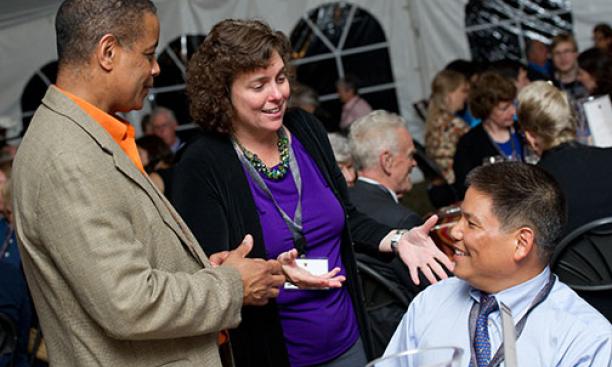

About 1,000 graduate alumni and guests returned to campus Oct. 17–19 for a singular homecoming event in their honor: Princeton’s first conference for the “Many Minds, Many Stripes” of graduate alumni from all departments. It was the latest in the series of flagship events that the University has hosted to reconnect with alumni populations who may have felt marginalized as students.
Coinciding with the 100th anniversary of the Graduate College, the conference began with a carillon performance, champagne toast, and climb up Cleveland Tower. The conference featured faculty lectures and discussions on issues including the economy, immigration, and cybersecurity. Social gatherings and department receptions saw alumni mingling with current students, faculty, and one another. For many alumni it was the first time they had been back since they had received their degrees.
“As graduate students, we were junior partners and apprentices in research at the frontiers of knowledge and in the teaching of undergraduates,” said Provost David Lee *99 in his opening remarks. With a campus culture centered on undergraduates, Lee acknowledged that graduate students could feel like the “neglected middle child” of the Princeton family. But he described his graduate experience as “the best years of my life,” and he foreshadowed many speakers’ remarks by pointing to the centrality of graduate students in the fabric of the University.
Other conferences Princeton has hosted in recent years focused on alumnae (“She Roars”), black graduates (“Coming Back and Moving Forward”) and LGBT alums (“Every Voice”).
There was a strong focus at “Many Minds” on the future of higher education, including a conversation with three graduate alumni now serving as college presidents. “The economic value of a graduate degree remains high; by many measures, higher than it has been in our history,” said President Eisgruber ’83 in a talk at Richardson Auditorium. “As a society, we are disinvesting in higher-education institutions in ways that will hobble our progress.”
William Russel, dean of the graduate school, pointed to investments that have transformed the student experience. He said the University has built better support structures, from expanded health benefits and family-focused initiatives to the creation of dissertation completion enrollment status, which allows students to remain fully enrolled beyond the normal period to complete their degrees.
Anthony Fiori *03, president of the Association of Princeton Graduate Alumni, noted that there has been “a steady rise in the number of our younger alums who are coming back, willing to serve on University task forces and boards, and that’s a direct result of the resources that have been invested in the graduate-student experience.”
Recent alumni said that as students, though, they were still sensitive to their “middle-child” status. “When I looked up from my small bubble on campus, I did feel a bit like graduate students were second-class citizens,” said conference attendee Elina Sarkisova *12.
Among the speakers at the conference were retired Gen. David Petraeus *85 *87, former CIA director; writer George Will *68; and Kavita Ramdas *88, who oversees the Ford Foundation’s work in India, Nepal, and Sri Lanka.
Participants also enjoyed spending time among old friends. Jordan Young *53 came to “reconnect with the old-timers,” he said. Young didn’t miss a beat when he ran into Robert Motley *58. The “boy from the coal mines!” Young recalled. “He might not remember what I studied, but he remembers the coal mines,” Motley said, laughing.
From beginning to end, said Fiori, the conference aimed to help alumni reconnect with each other and the University. “Folks wanted an interdisciplinary experience, intellectual in nature, and not just a party. They wanted speakers who inspired them, and a social aspect to connect with their former peers on campus and across the alumni community. Most of all, we wanted everyone to feel at home.”
